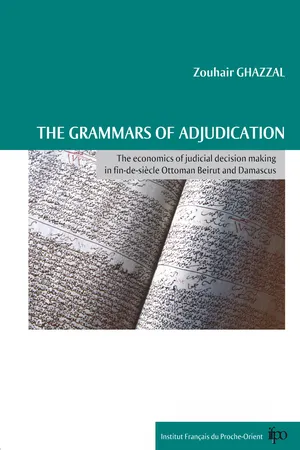
The grammars of adjudication
The economics of judicial decision making in fin-de-siècle Ottoman Beirut and Damascus
- English
- ePUB (mobile friendly)
- Available on iOS & Android
The grammars of adjudication
The economics of judicial decision making in fin-de-siècle Ottoman Beirut and Damascus
About this book
Most studies on Islamic, Arab, and Ottoman societies and civilizations are trapped into the evidentiary role of the texts that researchers have at their disposal, considerably reducing the role of text and language to a mimetic description of what happened. This book argues that an understanding of social relations primarily implies taking into consideration the textual production of society in terms of the meanings that could be ascribed to the texts themselves, and, second, that the analysis of texts, whatever their societal and institutional contexts, should look at its sources as discursive practices, in order not to reduce them to their preliminary role of bearers of factual evidence. Drawing from a large variety of Ottoman "legal" texts from nineteenth-century Beirut and Damascus, this book avoids ascribing such texts to the normative values of "Islamic law," by documenting instead how various discursive practices concretely operate within a particular terrain. Different levels of practises therefore emerge, all of which documented by the social actors that made their existence possible.
Frequently asked questions
- Essential is ideal for learners and professionals who enjoy exploring a wide range of subjects. Access the Essential Library with 800,000+ trusted titles and best-sellers across business, personal growth, and the humanities. Includes unlimited reading time and Standard Read Aloud voice.
- Complete: Perfect for advanced learners and researchers needing full, unrestricted access. Unlock 1.4M+ books across hundreds of subjects, including academic and specialized titles. The Complete Plan also includes advanced features like Premium Read Aloud and Research Assistant.
Please note we cannot support devices running on iOS 13 and Android 7 or earlier. Learn more about using the app.
Information
Table of contents
- Introductory pages
- Table of contents
- Introduction: Adjudication and judicial decision making as discursive practices
- Chapter 1: The discursive origins of the fiqh in light of the mounting fiction of the madhhab
- Chapter 2: Repetition and the reaffirmation of the ideal: The enterprise of judging and the “idealization of the absent”
- Chapter 3: Why status matters: Contractual settlements and propertyrights in light of their transaction costs
- Chapter 4: Mourning the past:The thin line between ownership and possession
- Chapter 5: The ethnography of court documents: The transfer of property to women I
- Chapter 6: Waqfs as contractual settlements: The transfer of property to women II
- Chapter 7: Fatwas at the rescue of hard cases
- Chapter 8: The language of judges and the performance of speech acts
- Chapter 9: Judicial policy making and the politics of the regional councils
- Chapter 10: Hanafi practice and sultanic ordinances: Which normative rules did finally prevail?
- Chapter 11: The phantom of the victimand the triangle of debt
- Epilogue: Society as text: the infernal cycle of credit and debt
- Annexes